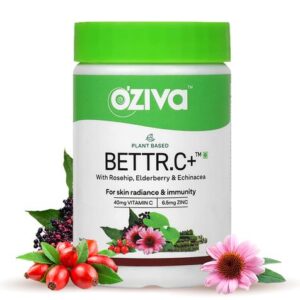
Vitamins & Minerals are essential nutrients that are important for the proper functioning of the body. They play an important role in our body, and a deficiency or over-consumption may lead to serious illnesses.
While a healthy diet is the best way to obtain an adequate amount of vitamins and minerals that you need, they can also be taken in the form of supplements.
What are vitamins and minerals?
Vitamins and minerals are an essential part of your diet. You don’t need too much. But, if you don’t get enough vitamins and minerals, your body won’t perform essential bodily functions.
The difference between vitamins and minerals lies in their chemical structure. Vitamins can be decomposed, but minerals are inorganic and cannot be fractionated into small chemical units.
Vitamins are fat-soluble or water-soluble. But, water-soluble vitamins like vitamin B-complex, C only remain present in the body for a short period before the excess gets excreted in the form of urine and sweat. Hence, these must be replenished through diet constantly.
Fat-soluble vitamins are stored in fatty or adipose tissue and don’t need constant replenishment.
Why do I need vitamins and minerals?
While there are many functions of minerals and vitamins, let’s look at some of those.
- Regulates Metabolism and Digestion: Vitamins like B-Complex, D and minerals like calcium, iron etc. are needed to maintain homeostasis. The absence of iodine can reduce the body’s metabolism and result in weight gain.
- Prevents diseases: Vitamins like C, B6 and E boost the body’s immune system.
- Provides energy: B-vitamins are essential for producing energy in the cells. Similarly, the deficiency of Iron, Vitamin D, etc. can lead to fatigue, exhaustion and loss of energy.
- Boost skin and hair health: Vitamin E plays a role in keeping the skin hydrated, whereas Vitamin C is necessary for collagen production. Biotin plays an important role in skin, hair and nail health.
- Needed for bone health: Calcium and Vitamin D play an important role in keeping the bones strong and preventing degenerative diseases like osteoporosis.
What are the sources of vitamins and minerals?
Your body creates some nutrients like Vitamin B that is produced by bacteria in the gut. But there are many nutrients that we only get from external sources like nutritious foods or supplements.
Unprocessed whole foods such as vegetables, fruits, nuts, seeds, pulses, whole grains, dairy products, and animal proteins are also very rich in vitamins and minerals. Get your diet checked by a nutritionist or a physician to see if you’re consuming all the nutrients you need, the right way. If you’re missing out, opt for clean plant-based vitamin and mineral supplements.
What could lead to a deficiency of vitamins and minerals?
This could happen in the following scenarios:
1. Requirement is not met via diet
2. Absorption of nutrients is affected due to a physical condition/syndrome, the consumption is in a manner that prevents absorption, the form of nutrient consumed is not suited for the body.
In the first scenario, one can incorporate certain food items into the everyday diet, if that isn’t possible, then you can opt for plant-based supplements.
In the second scenario, if you’re suffering from a condition that prevents nutrient absorption, it is important to get treatment for the same.
Apart from that, certain nutrients when consumed together hinder each others’ absorption. For example, iron and calcium when consumed together form a stable complex and neither get absorbed. Meanwhile, iron when consumed with vitamin c, folic acid and zinc benefit the body more. Thus, it’s important to consume nutrients the right way.
The form of nutrients also affects absorption. For example, synthetic calcium is difficult to absorb and tends to get deposited in blood vessels and even kidneys. However, plant-based calcium has better absorption and when combined with Vitamin D, gets deposited on the bone.
It is important to understand the root cause of deficiency with the help of your physician to resolve it.
Conclusion
Vitamins and minerals are essential to the everyday functioning of the body. To live a fit life, apart from exercising, focusing on the calories in our diet, we should also focus on the presence of these macro and micronutrients in our food. This will empower us to reduce wherever there is excess and compensate where needed. Opting for plant-based supplements is the easiest way to add the essential vitamins and minerals to your diet as they get absorbed easily and the combinations are designed in a way to ensure that you get the best benefits out of it.
Last modified: July 20, 2021



